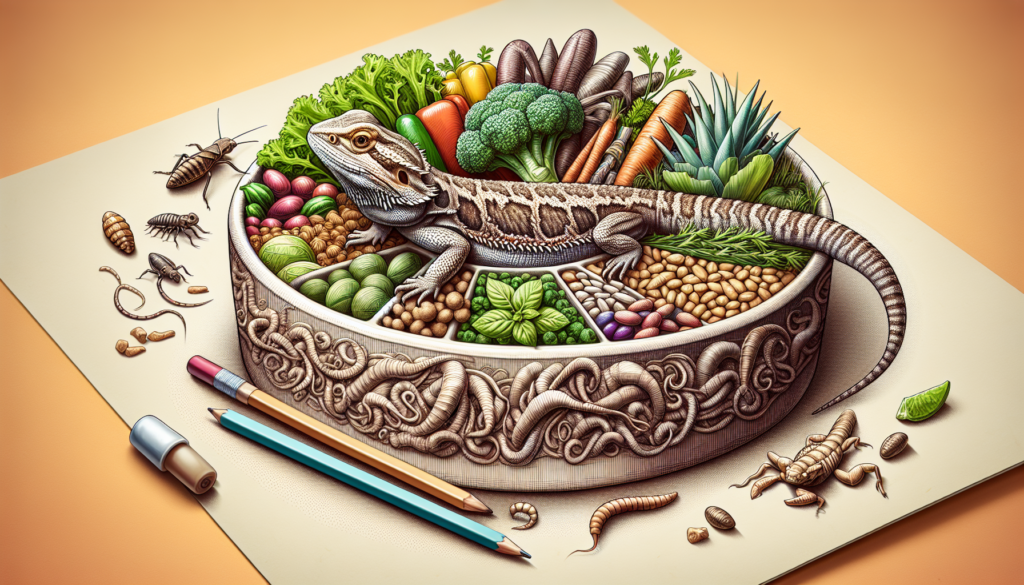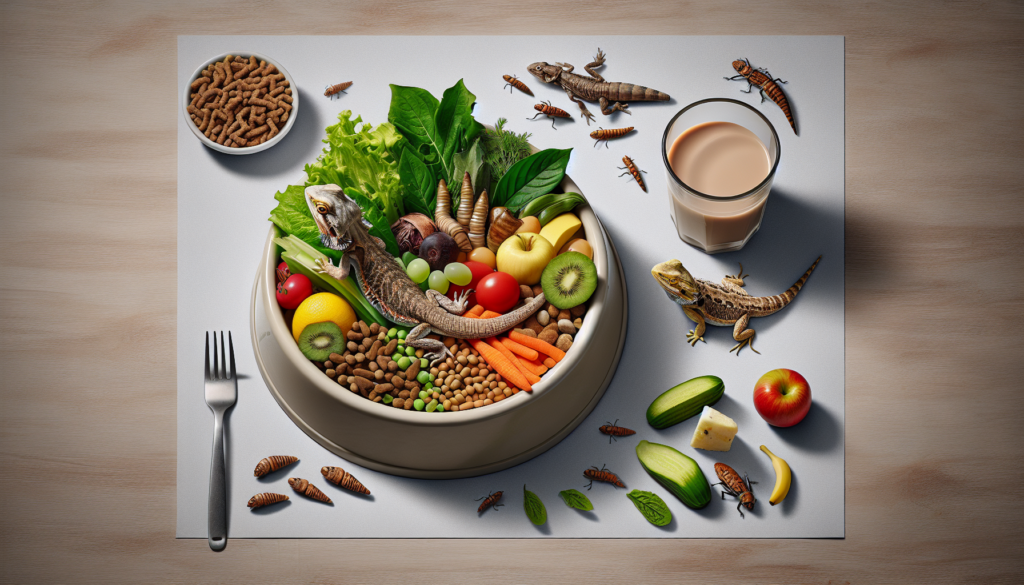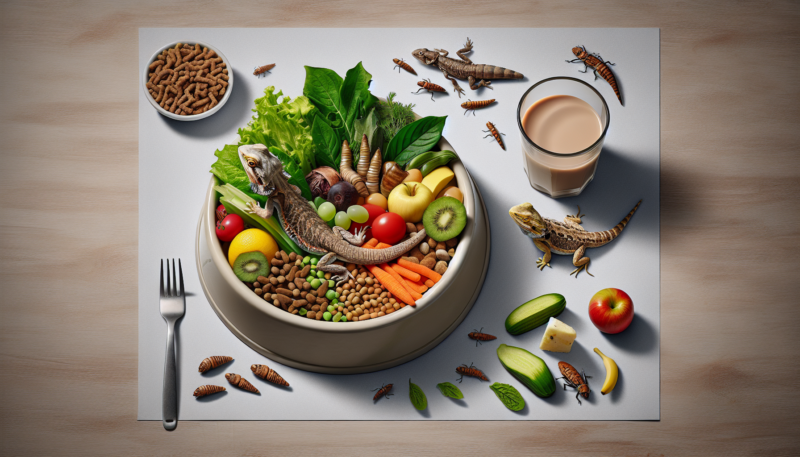You likely know how important a balanced diet is for your own health, but have you ever thought about the dietary needs of your pet bearded dragon? Just like humans, these fascinating reptiles require a nutritious and well-rounded meal plan to thrive. In this article, we will explore the key elements of a bearded dragon’s diet, with a particular focus on providing the essential nutrients they need to lead a happy and healthy life. So, whether you’re an experienced bearded dragon owner or considering adding one to your family, understanding their diet is crucial for their well-being and happiness. Let’s dive into the world of bearded dragon nutrition and discover the best choices for their daily meals.
Benefits of a Proper Bearded Dragon Diet
A proper diet is crucial for the overall health and wellbeing of your bearded dragon. By providing a well-balanced and nutritious diet, you can promote their overall health, support proper growth and development, improve digestion, and boost their immune system.
Promotes overall health
A proper diet ensures that your bearded dragon receives all the essential nutrients required for maintaining good health. By providing a variety of foods that meet their nutritional needs, you can help prevent deficiencies and promote optimal functioning of their body systems. A healthy diet helps to maintain a strong immune system, prevent illnesses, and increase their lifespan.
Promotes proper growth and development
Young bearded dragons require a diet that is rich in nutrients to support their rapid growth and development. Feeding them a variety of protein-rich foods, along with appropriate amounts of vegetables and fruits, helps to ensure that they grow properly and develop strong bones, muscles, and organs. A balanced diet also reduces the risk of growth-related issues and deformities.
Improves digestion
A proper bearded dragon diet includes foods that facilitate healthy digestion. High-fiber vegetables and fruits aid in digestion and prevent constipation. Additionally, feeding them the right amount of protein and providing ample hydration helps to maintain a healthy gut and prevent digestive problems such as impaction. A well-functioning digestive system promotes nutrient absorption and reduces the risk of illnesses.
Boosts immune system
A nutritious diet plays a significant role in strengthening the immune system of bearded dragons. Foods rich in vitamins, minerals, and antioxidants help to boost their immune response and protect against infections and diseases. By providing a variety of foods that cover their nutritional requirements, you can enhance their resilience to illnesses and promote overall wellness.
Feeding Schedule for Bearded Dragons
Establishing a proper feeding schedule is essential to ensure that your bearded dragon receives the right amount of nutrients without overfeeding. The feeding frequency, types of food, and feeding tips are important factors to consider when creating a feeding schedule.
Frequency of feeding
Adult bearded dragons should be fed once a day, while juvenile dragons may require two smaller meals daily. Adjust the portion size based on your dragon’s appetite and activity level. It’s important not to overfeed, as obesity can lead to various health issues. However, make sure their food intake is sufficient to meet their energy requirements.
Types of food
Bearded dragons require a balanced diet that consists of protein, vegetables, fruits, and supplements. Insects are an important source of protein, while vegetables and fruits provide essential vitamins and minerals. It is crucial to offer a variety of foods to ensure a diverse nutrient intake. Additionally, bearded dragons benefit from regularly supplementing their diet with calcium powder and a multivitamin supplement.
Feeding tips
When offering food to your bearded dragon, it’s important to provide appropriately sized prey items and cut vegetables and fruits into manageable pieces. Monitoring their feeding behavior and adjusting the portion size accordingly helps prevent overeating and ensures they receive a balanced diet. Always offer fresh, pesticide-free foods and remove uneaten items from the enclosure to maintain cleanliness.

Nutritional Requirements for Bearded Dragons
Understanding the specific nutritional requirements of bearded dragons is essential to provide them with a diet that meets their needs. Here are the key components that should be included in their diet:
Protein
Protein is essential for bearded dragons, especially during their growth phase. Insects such as crickets, dubia roaches, mealworms, superworms, and silkworms are excellent sources of protein. Feed them appropriately sized insects to avoid choking hazards and ensure they receive the necessary amount of protein for their development.
Vegetables and fruits
Vegetables and fruits provide essential vitamins, minerals, and fiber to support the overall health of your bearded dragon. Leafy greens such as collard greens, kale, and dandelion greens are rich in calcium and should be a staple in their diet. Other vegetables like squash, sweet potatoes, bell peppers, carrots, and cucumbers can be offered as well. Fruits, such as berries, apples, melons, peaches, and grapes, should be given in moderation due to their high sugar content.
Calcium and vitamin D3
Calcium is crucial for maintaining strong bones and preventing metabolic bone disease in bearded dragons. Dusting their insects and vegetables with calcium powder can help ensure they receive an adequate amount of this essential mineral. Vitamin D3 is essential for proper calcium absorption, and bearded dragons can obtain it through exposure to UVB lighting. A combination of calcium powder and proper UVB lighting is vital for maintaining their calcium levels.
Water
While bearded dragons primarily obtain water from the foods they eat, it is still important to provide them with a shallow dish of fresh, clean water at all times. Bearded dragons may not drink water frequently, but having it available ensures their hydration needs are met. Monitor their water intake and ensure the dish is kept clean and easily accessible.
Main Food Sources for Bearded Dragons
To provide a well-rounded diet for your bearded dragon, it is important to offer a variety of food sources. Here are the main categories of food that you should include in their diet:
Insects
Insects are a vital source of protein for bearded dragons. Whether it’s crickets, dubia roaches, mealworms, superworms, silkworms, or other feeder insects, these lively critters provide essential nutrients for your dragon’s growth and overall health. It is important to gut-load the insects before offering them to your bearded dragon to ensure they are receiving maximum nutritional value.
Vegetables
Vegetables make up a significant portion of a bearded dragon’s diet. Leafy greens such as collard greens, kale, and dandelion greens are excellent choices due to their high calcium content. Other vegetables like squash, sweet potatoes, bell peppers, carrots, and cucumbers offer a variety of vitamins and minerals. Offer a mix of different vegetables to provide a diverse nutritional profile.
Fruits
While fruits should be given in moderation due to their high sugar content, they can still be a part of your bearded dragon’s diet. Berries, apples, melons, peaches, and grapes are some examples of fruits that can be offered occasionally. Remember to remove any seeds, pits, or rinds that could pose a choking hazard or introduce toxins.

Insects for Bearded Dragons
Insects are a vital component of a bearded dragon’s diet, providing essential protein and nutrients. Here are some common insects that are suitable for feeding your bearded dragon:
Crickets
Crickets are a staple insect for bearded dragons. They are readily available, easy to raise, and can be dusted with calcium powder for added nutritional value. It is important to choose appropriately sized crickets based on the age and size of your dragon to prevent choking or digestive issues. Opt for gut-loaded crickets for enhanced nutritional content.
Dubia Roaches
Dubia roaches are becoming increasingly popular among bearded dragon owners due to their nutritional profile and ease of keeping. They have a soft exoskeleton, making them easier to digest than some other insects. These roaches should also be gut-loaded before feeding them to your bearded dragon.
Mealworms
Mealworms are common feeder insects that can be a good source of protein for bearded dragons. However, they should be offered sparingly due to their high-fat content. Mealworms can be a good treat or occasional addition to your dragon’s diet but should not make up the majority of their protein intake.
Superworms
Superworms are similar to mealworms but are larger in size. They can be fed to adult bearded dragons, but caution should be exercised due to their harder exoskeleton, which could cause digestive issues if not chewed properly. Moderation is key when offering superworms to your dragon.
Silkworms
Silkworms are highly nutritious and well-tolerated by bearded dragons. They are low in fat but high in calcium, making them an excellent choice for promoting healthy bones and muscle growth. Silkworms can be offered as a regular part of your dragon’s diet.
Gut-loading insects
Gut-loading is the process of feeding nutritious foods to the insects before offering them to your bearded dragon. This increases the nutritional value of the insects and ensures your dragon receives an enhanced meal. Foods such as leafy greens, grains, and fruits can be provided to the insects for at least 24 hours before feeding.
Vegetables for Bearded Dragons
Vegetables play a crucial role in a bearded dragon’s diet, providing essential vitamins and minerals. Here are some vegetables that are nutritious and safe for your bearded dragon to consume:
Leafy greens
Leafy greens, such as collard greens, kale, and dandelion greens, are rich sources of calcium and other important nutrients. These greens should be a staple in your bearded dragon’s diet, providing them with the necessary vitamins and minerals for strong bones and overall health. Rotate between various leafy greens to ensure a varied nutritional intake.
Squash and sweet potatoes
Squash and sweet potatoes are excellent sources of vitamins A and C, as well as dietary fiber. These vegetables provide a good balance of nutrition and can be cooked or offered raw. Chop them into small, manageable pieces to make it easier for your bearded dragon to eat.
Bell peppers
Bell peppers are a great source of antioxidants and vitamin C. They come in various colors and can be offered in small portions to provide essential nutrients and add variety to your dragon’s diet. Remove the seeds and membranes before offering them to your dragon.
Carrots
Carrots are a well-known source of vitamin A and are easily consumed by bearded dragons. They can be grated or chopped into small pieces for easy consumption. Raw or cooked carrots can both be offered, but avoid using butter or oils while cooking.
Cucumbers
Cucumbers are hydrating and low in calories, making them a refreshing addition to your bearded dragon’s diet. They contain vitamins and minerals that support overall health. Slice them into thin rounds or matchstick-like pieces to make eating easier for your dragon.
Fruits for Bearded Dragons
Fruits can be offered to your bearded dragon as occasional treats due to their higher sugar content. Here are some fruits that can be included in their diet in moderation:
Berries
Berries, such as blueberries, strawberries, raspberries, and blackberries, are rich in antioxidants and can provide a range of vitamins and minerals. Offering small portions of these fruits can add variety to your dragon’s diet and provide a sweet treat.
Apples
Apples are a popular fruit that can be enjoyed by bearded dragons. Remove the seeds and core before slicing the apple into small, manageable pieces. Apples offer a good balance of fiber and vitamins and can be a tasty addition to their diet.
Melons
Melons like cantaloupe, honeydew, and watermelon can be offered to your bearded dragon as a refreshing treat. Remove the seeds and rind and cut the melon into small, bite-sized pieces. Remember to feed melons in moderation due to their high water and sugar content.
Peaches
Peaches provide a good range of vitamins and minerals, including vitamin A and C. They should be peeled and the pit removed before offering them to your dragon. Chop the peach into small pieces and feed it as an occasional treat.
Grapes
Grapes, whether green, red, or purple, can be a sweet and juicy snack for your bearded dragon. Ensure that the grapes are seedless and cut them into small pieces to prevent choking hazards. Offer grapes in moderation due to their high sugar content.
Supplements for Bearded Dragons
Supplements play a crucial role in ensuring that your bearded dragon receives all the necessary vitamins and minerals. Here are some supplements that can enhance their diet:
Calcium powder
Calcium powder is an essential supplement for bearded dragons. It helps support bone health and prevent metabolic bone disease. Dusting insects and vegetables with a calcium powder specifically formulated for reptiles ensures that your dragon receives an adequate amount of calcium. Follow the instructions on the packaging for dosage recommendations.
Multivitamin supplement
A multivitamin supplement can provide additional vitamins and minerals that may be lacking in their regular diet. Look for a reptile-specific multivitamin and use it according to the manufacturer’s instructions. Over-supplementing can be harmful, so it’s important to follow the recommended dosage.
Frequency of supplementation
Supplementation should be done based on the age and needs of your bearded dragon. Young dragons require more frequent supplementation, while adult dragons may require less. Follow the dosage instructions provided with the supplements and consult with a reptile veterinarian if you have any specific concerns or questions.
Preparing Food for Bearded Dragons
Properly preparing and serving food to your bearded dragon is vital to ensure their safety and optimal nutrition. Here are some guidelines to follow:
Washing fruits and vegetables
Before offering fruits and vegetables to your bearded dragon, it’s important to thoroughly wash them to remove any dirt, pesticides, or chemicals. Use lukewarm water and a clean produce brush to clean the outer surface of the fruits and vegetables. Rinse them thoroughly to ensure they are free from any potential contaminants.
Chopping and shredding
To make it easier for your bearded dragon to eat, chop or shred vegetables and fruits into small, bite-sized pieces. This helps reduce the risk of choking and makes it more manageable for them to consume. Pay attention to the size of the pieces, especially when feeding younger dragons, to prevent any issues with digestion or obstruction.
Avoiding toxic plants
It is crucial to avoid feeding your bearded dragon any plants that are toxic to them. Some common household plants, such as ivy, aloe vera, and certain types of lilies, can be harmful or even fatal to bearded dragons. Always research the safety of a specific plant before offering it to your dragon, and never let them forage in outdoor areas that may contain toxic plants.
Common Dietary Issues in Bearded Dragons
While proper nutrition is essential for the good health of bearded dragons, there are some common dietary issues that owners should be aware of:
Obesity
Overfeeding and a diet rich in fatty foods can lead to obesity in bearded dragons. Obesity increases the risk of various health problems, including metabolic disorders and cardiovascular issues. Feeding appropriate portion sizes and providing a balanced diet that meets their nutritional needs can prevent obesity in bearded dragons.
Malnutrition
Malnutrition can occur when bearded dragons are not provided with a well-balanced diet that meets their nutritional requirements. Insufficient intake of vitamins, minerals, or protein can lead to developmental issues, weakened immune systems, and organ dysfunction. Make sure to offer a variety of foods and provide appropriate supplements to prevent malnutrition.
Impaction
Impaction occurs when a bearded dragon ingests indigestible material, such as substrate or large food items, that gets stuck in their digestive system. It can lead to blockages and potentially life-threatening complications. Offering appropriately sized prey items, avoiding loose substrates, and ensuring proper hydration can help prevent impaction.
Metabolic bone disease
Metabolic bone disease (MBD) is a common condition in bearded dragons caused by a lack of calcium or an imbalance of calcium and phosphorus in their diet. MBD can lead to weak bones, fractures, and other musculoskeletal abnormalities. Ensuring that your bearded dragon receives adequate calcium, vitamin D3, and a balanced diet is crucial for preventing MBD.
By understanding the dietary requirements of bearded dragons and providing a balanced and nutritious diet, you can ensure their optimal health and wellbeing. Consult with a reptile veterinarian or a knowledgeable breeder to develop a feeding plan that meets the specific needs of your bearded dragon. With proper nutrition, your bearded dragon can thrive and live a long, healthy life.
